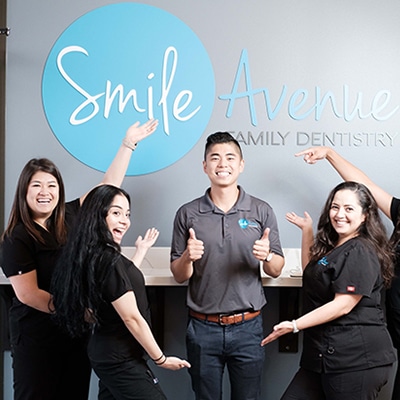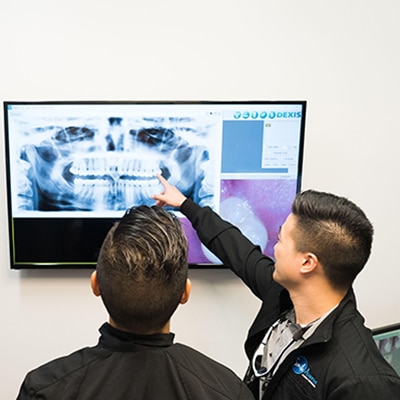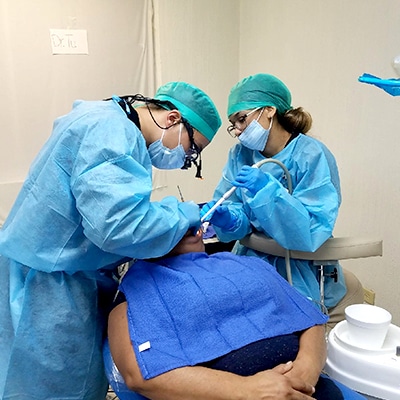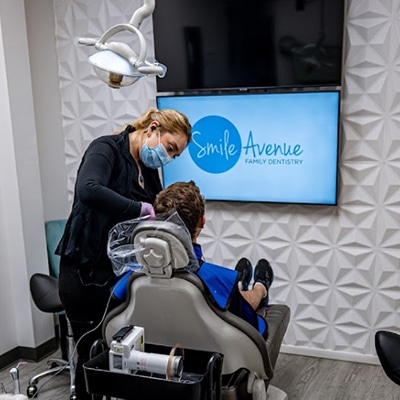
Baby bottle tooth decay was the term once used to describe cavities (tooth decay) in baby teeth. These days, it’s known as early childhood caries. Cavities are known medically as caries.
Cavities can affect children at any age, but they tend to develop in baby teeth more quickly than in adult (permanent) teeth. As soon as baby teeth erupt, which is typically between the ages of six months and a year, they can begin to form.
What is tooth decay (caries or cavities)?
Tooth decay, also known as caries or cavities, is a dental condition caused by specific bacteria in the mouth that thrive on sugars and refined carbohydrates, leading to the production of acids as a byproduct. Initially, these acids target the hard outer layer of the tooth, known as enamel. Over time, the acids can penetrate the tooth’s softer mineral component, dentin. If left untreated, tooth decay has the potential to damage significant portions of the tooth and may infect the nerve (pulp) located at the center. In older adults, exposed root surfaces are also susceptible to decay. Despite having numerous contributing factors, tooth decay is a highly preventable condition.
Baby Tooth Decay Symptoms
The first step is to become familiar with the symptoms of decay, and your child’s gums are the best place to start. Their frequent bleeding, redness, or swelling are most frequently the result of microorganisms that have become trapped. The gum line surrounding your baby’s front teeth is one place to pay close attention to since it may have tiny white dots that indicate the presence of plaque. Regular dental appointments should begin as soon as the first tooth erupts, which is often at six months, as these signs can be difficult to identify without the right tools.
Causes of Cavities in Baby Teeth
- Sugar and a certain kind of bacteria found in the mouth are the causes of cavities. The sugar found in meals and beverages, including breast milk, is converted by oral bacteria into an acid that can wear away at teeth’s enamel, the hard outer layer.
- Compared to permanent teeth, infant teeth have weaker enamel. This facilitates the acid’s ability to damage teeth and result in cavities.
- Within twenty minutes, acid can start to build every time your youngster drinks or eats something. If acid isn’t eliminated, it remains on the teeth.
- Spit, or saliva, aids in partially neutralizing the acid. A baby’s salivary flow slows down and they swallow less frequently while they sleep. Bacteria will then have more time to convert carbohydrates to acid.
- First to sustain damage are the first molars and upper front teeth. White patches on teeth are the initial indications of deterioration. Brown holes could eventually form from these.
It is impossible to avoid consuming sugar. Most foods include some. This includes:
- Nourishing foods, including breast milk, formula, cow’s milk, fruits, and vegetables.
- Carbohydrate-rich foods such as cereals, crackers, bread, and chips.
- Foods containing added sugar like cookies, chocolate milk, juice, Gatorade®, Kool-Aid®, and sticky fruit snacks.
How to Prevent Cavities and Have Healthy Teeth
Ensure your child’s oral health by following these guidelines:
- Clean your baby’s teeth, gums, and tongue with a clean, wet cloth at least twice a day, after feeding and at bedtime. Also, clean their mouth after giving any medicine containing sugar.
- Begin brushing your child’s teeth with fluoride toothpaste as soon as the first tooth emerges, doing so at least twice a day.
- Use a bottle only at feeding times and avoid using it or breastfeeding as a pacifier.
- Refrain from putting your baby to bed with a bottle of formula or breast milk. If your baby falls asleep while breastfeeding, remove your breast from their mouth.
- Once the first tooth appears, minimize night feedings and frequent, on-demand feedings.
- Transition your baby from a bottle to a cup by the age of 12 months.
- Avoid giving sugary drinks, juice, or water to a child under one year of age. Do not add sugars, like honey, to drinks.
- After 12 months, offer water between meals and after consuming anything sugary to rinse the mouth. Limit drinks to mealtimes, with occasional 4 ounces of 100% juice at a meal.
- Steer clear of gummy snacks and foods that can adhere to teeth for an extended period.
- Refrain from licking your child’s pacifier, spoon, or cup to prevent passing mouth bacteria.
- Use fluoride toothpaste about the size of a grain of rice for children under 3; for children aged 3 and older, use a pea-sized amount. Encourage spitting out the toothpaste, but it’s safe to swallow small amounts if your child doesn’t spit yet.
- Avoid rinsing after brushing to retain the fluoride on the teeth.
- After the first tooth emerges, consider having a dentist or dental hygienist apply a fluoride coat to your child’s teeth.
Ensuring proper oral hygiene for your baby is fundamental in preventing tooth decay and fostering optimal teeth development. Initiating regular cleaning with a wet cloth, incorporating fluoride toothpaste upon the emergence of the first tooth, and transitioning from a bottle to a cup by 12 months are key milestones. To safeguard your child’s dental health, it is imperative to limit sugary drinks, steer clear of sticky foods, and uphold consistent hygiene practices. Seeking the expertise of a kid’s dentist in Katy, TX, for fluoride applications can add an extra layer of defense for your child’s growing teeth. By instilling these habits early on, you lay the groundwork for a lifetime of excellent oral health.
Questions Related to Cavities in Baby Teeth
Do cavities in my baby’s teeth affect their permanent teeth?
Yes. The presence of tooth decay and cavities in baby teeth can increase the likelihood of permanent teeth growing misaligned or experiencing delayed eruption in your child.
Should I get my baby’s cavities filled?
Certainly. Yes, fillings are a safe and preferred treatment option for infants and their baby teeth. This also helps prevent the spread of cavities in your toddler’s mouth.
Should I brush my baby’s teeth?
Absolutely. It is advised to commence brushing your baby’s teeth twice daily with baby fluoride toothpaste as soon as their first tooth begins to emerge. Dentists recommend that an adult handles the brushing until the child reaches the age of 7, at which point they can start taking charge.
When should dentist visits start?
When your baby’s first tooth erupts, which is also when brushing should begin, is the ideal time for the first dental appointment. It is advised that you follow up with them every six to twelve months following the initial appointment.









